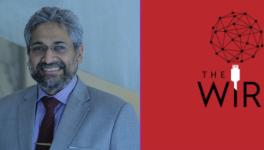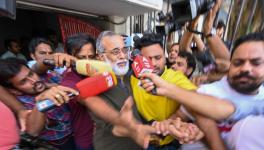Delhi Union of Journalists Concerned Over Policing of Scribes, Rising Hate Speech

Image Courtesy: Twitter
Delhi: The Delhi Union of Journalists (DUJ) has expressed grave concerns over the increasing policing of journalists and journalism in India in the past year as reflected in the Human Rights Watch Report of 2023 released last week and an inordinate rise in hate speech against minorities.
According to the HRW report, several journalists were arrested during the year including Mohammed Zubair and Rupesh Kumar Singh while others like Siddique Kappan remained imprisoned. The DUJ statement underlined the report’s finding that the situation in Kashmir was the worst in 2022 with the arrests of Fahad Shah and Sajad Gul. The report says, “35 journalists in Kashmir have faced police interrogation, raids, threats, physical assault, restrictions on freedom of movement, or fabricated criminal cases for their reporting,” since August 2019 when J&K’s special status was revoked. The report also refers to the use of Pegasus spyware to target media persons among other assaults on the press.
The union further highlighted its opposition to an increasing tendency of hate speech, especially targeting minorities. On the issue of hate speech, DUJ cited that the Supreme Court has questioned the dithering of the News Broadcasting and Digital Standards Authority (NBDSA) and pulled it up for being inactive on hate speech issues.
While hearing a batch of cases highlighting inaction by states in instances of hate speech against Muslims and Christians, the Supreme Court on Friday told the Centre and states to take these instances seriously. It observed that hate speech was nothing short of a “menace”, which. if left unchecked, could become a monster. The apex court also observed that television channels in India are dividing society because they are motivated by agendas, which the DUJ welcomed in its statement.
In a joint statement on Sunday, DUJ President S K Pande and General Secretary Sujata Madhok called for a halt to press bashing. They suggested the setting up of Media Council of India to replace both the toothless Press Council and the NBDSA, “which more than often is a prisoner of indecision.” The organisation noted that various governments in the past, including the Congress and later the BJP government with Sushma Swaraj as Information Minister, had recommended a Media Council with more teeth.
DUJ noted with concern “the hostile takeover of the news channel NDTV and the consequent spate of resignations from the channel, starting with the independent anchor Ravish Kumar, followed by group president Suparna Singh, chief strategy officer Arijit Chatterjee and chief technology and product officer Kawaljit Singh Bedi.” The union added, “This spate of resignations could multiply as the Adani group takes full control of the NDTV group.”
DUJ said, “NDTV was one of the last channels that reported somewhat independently, instead of merely mouthing government and corporate propaganda and amplifying divisive, communal hate speech.”
While welcoming the Supreme Court’s observations, the DUJ said it is of the firm view that “the long-term answer lies both in Parliament taking steps to have a statutory broad-based Media Council, comprising the entire wide spectrum media to replace the Press Council with some more powers rather than giving the government policing powers or overriding powers to any other body.”
Get the latest reports & analysis with people's perspective on Protests, movements & deep analytical videos, discussions of the current affairs in your Telegram app. Subscribe to NewsClick's Telegram channel & get Real-Time updates on stories, as they get published on our website.






















